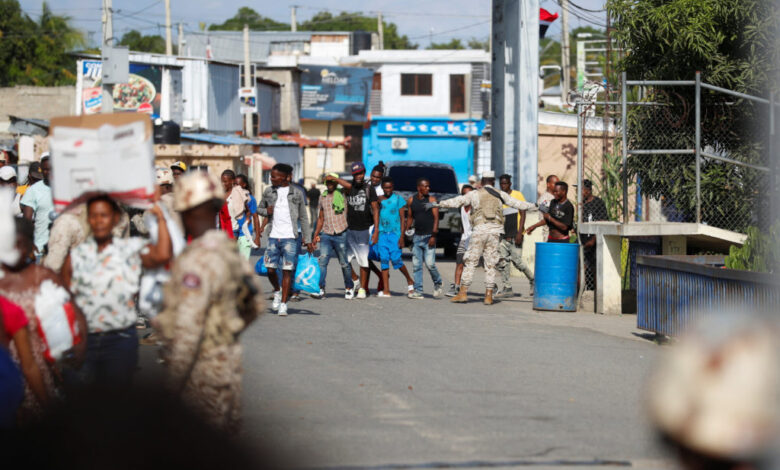Dominican Republic Haiti Border Closure

The border closure between the Dominican Republic and Haiti is a significant event with far-reaching implications for both countries and the wider Caribbean region. This complex geopolitical issue, deeply rooted in historical, economic, and social factors, has been a subject of intense debate and concern. The Dominican Republic-Haiti border closure not only impacts the bilateral relations between these two nations but also poses humanitarian, economic, and security challenges. This article aims to explore the various dimensions of the Dominican Republic-Haiti border closure, its causes, effects, and the broader implications for the region.
Historical Context: The Root of Tensions
To fully comprehend the intricacies of the Dominican Republic-Haiti border closure, it’s essential to understand the historical context of the two countries’ relationship. Sharing the island of Hispaniola, the Dominican Republic and Haiti have a long, complex history marked by cultural, linguistic, and economic differences. The colonial era, which saw the island divided between French and Spanish rule, laid the foundation for these disparities. Post-independence, the relationship between the two countries has been characterized by periods of conflict and cooperation, shaped by political, social, and economic factors.
Catalysts for the Border Closure
The decision to close the border did not occur in isolation but was the result of a series of events and escalating tensions. Key factors contributing to this decision include political instability in Haiti, concerns over illegal migration, and issues related to trade and security. The Dominican Republic has often expressed concerns about the uncontrolled flow of people and goods across the border, citing economic strain and security risks. Additionally, political turmoil and economic hardship in Haiti have led to an increase in migration to the Dominican Republic, exacerbating tensions and prompting strict border control measures.
Humanitarian and Social Impact
The border closure has significant humanitarian and social implications, particularly for Haitian migrants and their families. Many Haitians rely on access to the Dominican Republic for employment, healthcare, and other essential services. The closure disrupts these activities, leading to economic hardship and social dislocation. Furthermore, there are concerns about human rights violations, including the treatment of Haitian migrants in the Dominican Republic and the impact of the closure on vulnerable populations, including women and children.
Economic Repercussions
The economic impact of the Dominican Republic-Haiti border closure is profound, affecting both countries. For Haiti, the closure means limited access to markets and resources, exacerbating its economic challenges. The Dominican Republic, while aiming to protect its economy and resources, also faces consequences. The closure disrupts trade and commerce, affecting businesses and industries that depend on cross-border activities. This includes formal trade as well as informal economic activities, which play a significant role in the border regions’ economies.
Security Concerns and Challenges
Security is a central issue in the discussion of the border closure. The Dominican Republic cites security concerns as a primary reason for closing the border, pointing to issues such as smuggling, drug trafficking, and other illegal activities. The challenge lies in balancing security measures with humanitarian considerations and economic needs. There is also the risk of the closure exacerbating tensions and leading to incidents along the border, further complicating the situation.
Diplomatic and International Response
The international community, including regional organizations and human rights groups, has been closely monitoring the situation. Diplomatic efforts to address the border closure involve multiple stakeholders, including both governments, regional bodies like the Caribbean Community (CARICOM), and international organizations. The response focuses on finding a balanced solution that addresses security, economic, and humanitarian concerns while respecting the sovereignty of both nations.
Future Prospects and Possible Resolutions
Looking ahead, the resolution of the Dominican Republic-Haiti border closure issue requires diplomatic dialogue, cooperation, and a commitment to addressing the underlying factors contributing to the tensions. Potential solutions could involve collaborative border management strategies, economic cooperation agreements, and initiatives to address migration and security challenges. However, the path to resolution is complex, requiring mutual understanding, trust-building, and the willingness to address long-standing issues that have shaped the Dominican Republic-Haiti relations.
Conclusion: Navigating a Path Forward
In conclusion, the Dominican Republic-Haiti border closure is a multifaceted issue with deep historical roots and wide-ranging implications. It highlights the challenges of managing bilateral relations on a shared island with contrasting national realities. The closure’s impact extends beyond the immediate economic and security concerns, touching on humanitarian, social, and diplomatic aspects. As both countries navigate this complex issue, a balanced approach that considers the diverse and interconnected interests at play will be crucial for a sustainable and peaceful resolution. The future of Hispaniola’s two nations, in many ways, depends on the ability to collaboratively address and overcome the challenges posed by the Dominican Republic-Haiti border closure.



